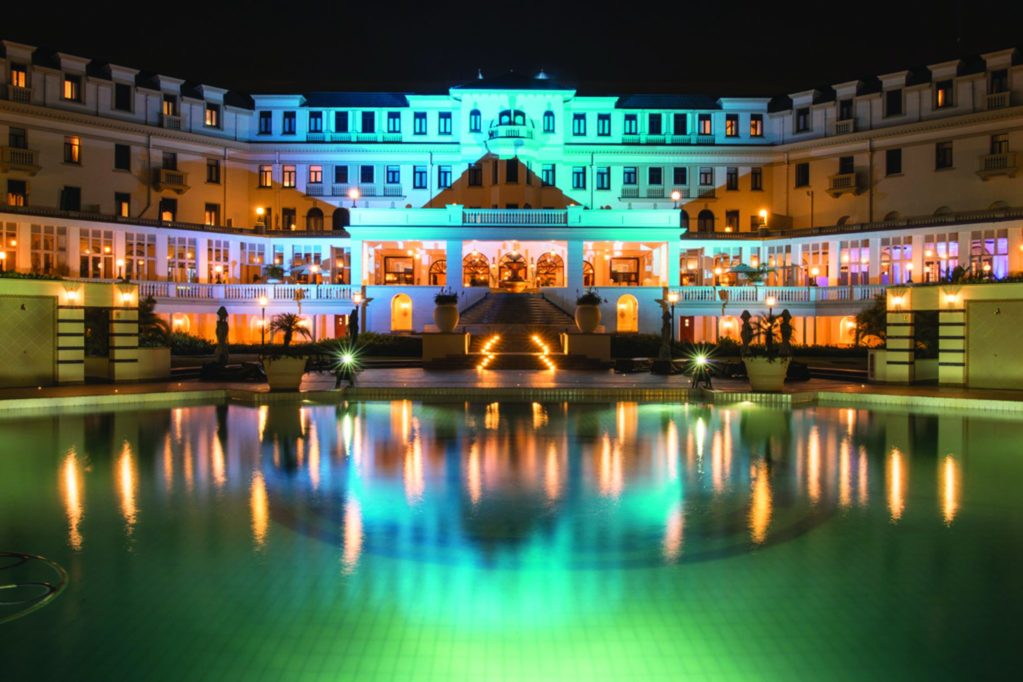Luis Nhaca is as much a diplomat as a doorman. His is the first face you see as you arrive at the collonaded entrance to the Polana Hotel in Mozambique. For three decades, he has marshaled the guests, and their luggage, through the portals of one of Africa’s most famous hotels. Many of those who passed through gave a badge as a memento. Nhaca has 396 of them on his coat to show for years of diplomatic service on the door. His favorite is from his beloved football club in Portugal, Benfica—handed to him by club chairman Luís Felipe Vieira. Benfica has always kept close links with a country that produced many of its legends including: Mário Coluna; Eusébio and Vicente. All three Africans, from Mozambique, played in the 1966 World Cup in one of the greatest ever Portuguese teams.
Their careers were over, but not forgotten by Nhaca, when he started work at the Polana in 1979, aged 12, in the laundry room. Nhaca learned the ropes from his father, Simeão, who had worked at the hotel for decades, on his way to becoming the face of the Polana.
Down the years, Nhaca has greeted them all: Jimmy Carter; Bill Clinton; Thabo Mbeki; Kenneth Kaunda and Robert Mugabe. His favorite guest was Luiz Inácio Lula da Silva, the former president of Brazil.
“Not only was he always very friendly to me, when he used to dispatch his ministers to Mozambique, he used to instruct them to greet me on his behalf,” says Nhaca speaking in Portuguese through a translator, on the busy steps of the Polana.
By far, the visitor Nhaca misses most is the late Samora Machel, the charismatic first president of independent Mozambique; a man-of-the-people, if ever there was one.
Loading...
“When he died, it left us with a scar,” says Nhaca.
Legend has it, Machel used to stroll between the marble pillars and under the sparkling chandeliers, in his green cap and army fatigues, greeting everyone from the cleaners to the concierge. Nhaca says Machel always insisted the hotel workers ate when he did at state banquets.
“Machel used to love Mozambican music. He used to sponsor a choir at the Polana and when he came here for dinner, he would ask them to sing for him by the pool. He would get very emotional and would get up and start dancing—his security men would surround him to shield him for fear he would hurt himself or fall in the pool!” says Nhaca with a smile.
The Polana may have been full of good cheer in the Machel years, but the business wasn’t. Independence, in 1975, saw the hotel run by the staff and used as a hostel for foreign workers. Supplies and spare parts were scarce and often staff would strip hardware from one floor to patch up a room on another.
The manager of the Polana, Miguel Afonso dos Santos, who left a five-star hotel in Lisbon to take up the job in Maputo, says in the lean days there were squares of newspaper, instead of toilet paper, in the bathrooms.
“The hotel had its ups and downs, but never stopped operating. When I said I was taking the job almost everyone I spoke to in Lisbon had a good memory to share with me. They would tell me that their grandparents were married in the hotel or their parents spent their honeymoon here,” says dos Santos.
The reality of running 142 rooms on a 10-acre site, so vast that it needs to employ 18 security guards as well as 400 workers, is not so romantic. When the Polana needs food or fittings, it has to import from South Africa, by road; shampoo or linen comes from Portugal by ship, taking up to five months.
“It is a problem because these days people want things now. We always have to keep one step ahead… I want to buy everything from Mozambique because it would take less time and make more sense. It is much better than it used to be, you can get a lot of things now from the local market, but I don’t know when the day will be when we can buy everything here. I have no idea,” says dos Santos.
Overall, dos Santos appears proud of a hotel that, despite being far from cheap, appears to have given the recession the slip. He says, this year, it is running at a capacity of 75% with plans to build 14 villas, in the expanse at the back that overlooks the sea, for long-stay guests. More than one in five of the guests are businesspeople from Portugal and South Africa. The hotel attracts its fair share of rich pop stars and playboys, but most come for business in a country riding a resource boom. On any given day, you can see the big deals being done in the restaurant overlooking the Indian Ocean.
A $25 million facelift, completed in 2011, shows the proprietors, an arm of the Nairobi-based, Serena Hotels, owned by the Aga Khan, are looking to the future for a building steeped in the past. It modernized the classic architectural lines drawn up by the Polana’s creator, Herbert Baker, nearly a century ago. The English architect also designed the Union Buildings and Pretoria Station, in South Africa.
“This is a demanding job, this is not just another hotel. I am responsible for a big brand. We host people like Ban Ki-moon—it is our responsibly to keep the mirror of the nation shining. When people come here from nations around the world they want to talk to me about what is happening in this country. I am almost a diplomat,” says dos Santos.
The man on the door agrees.
Loading...
